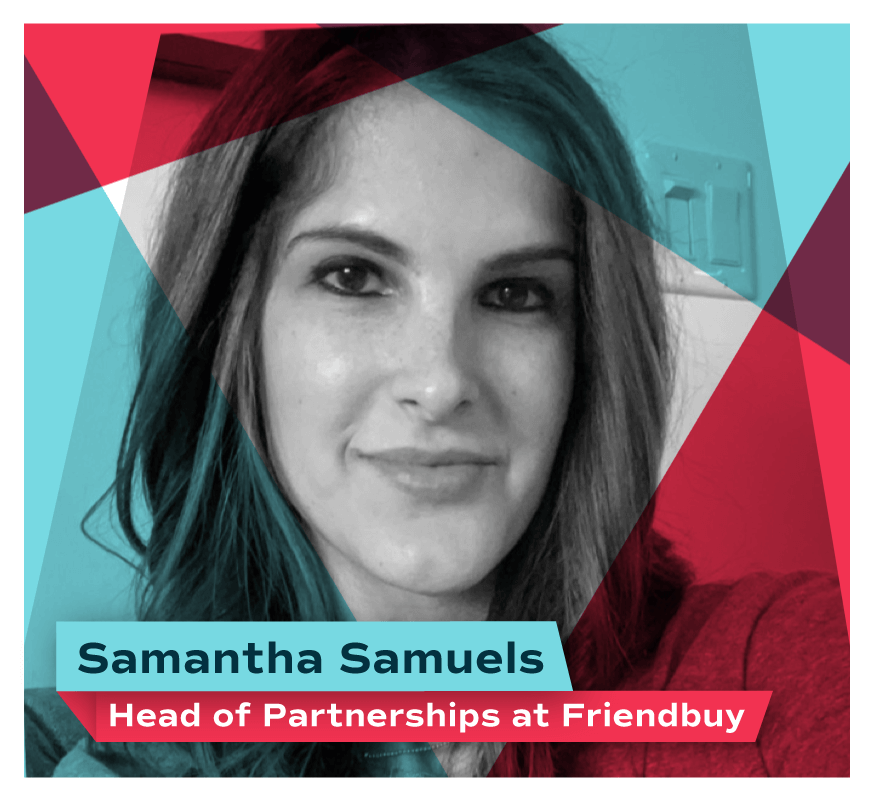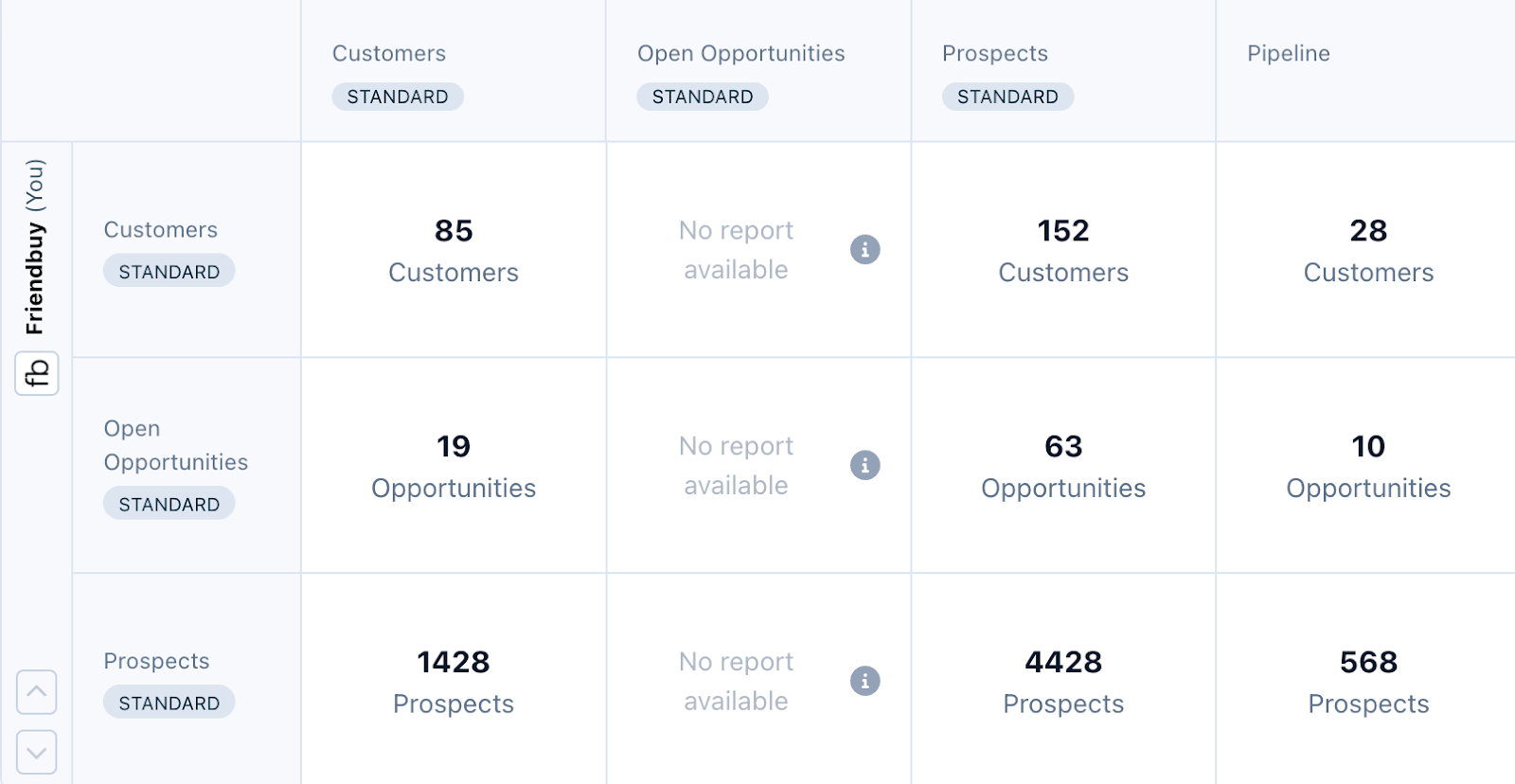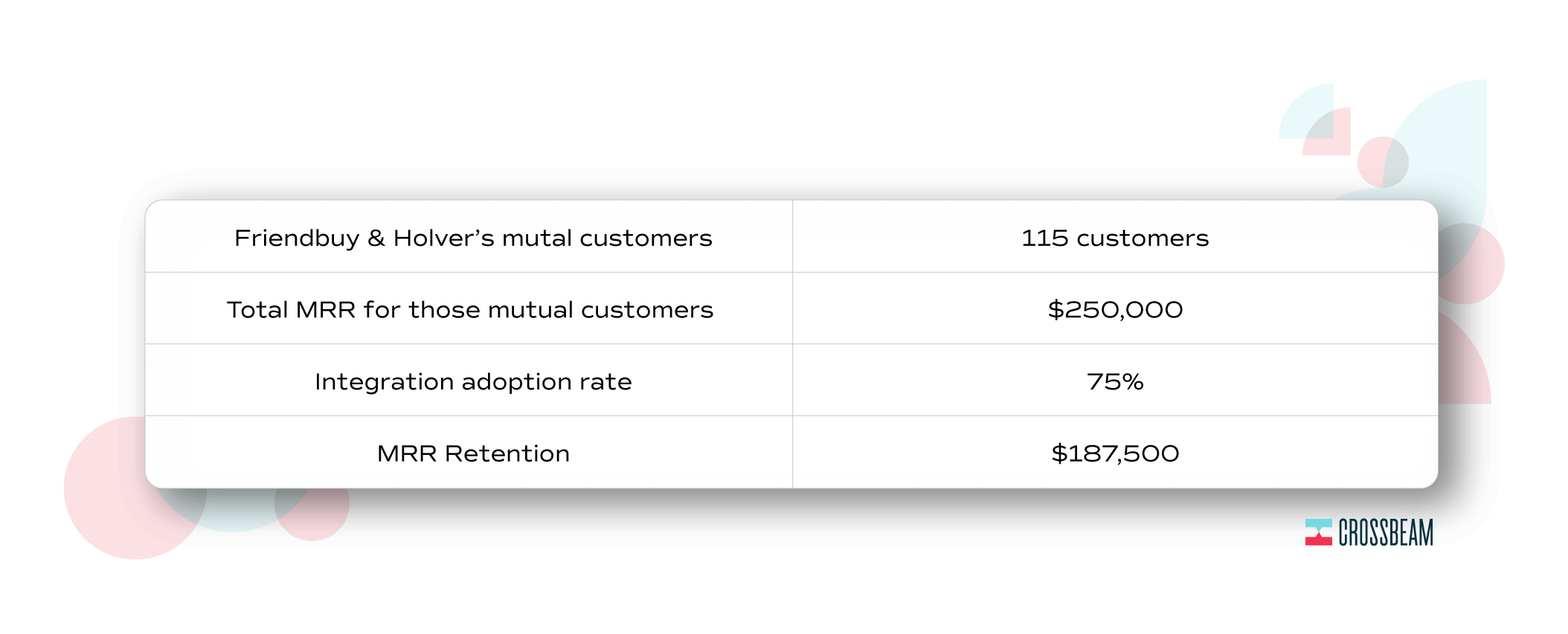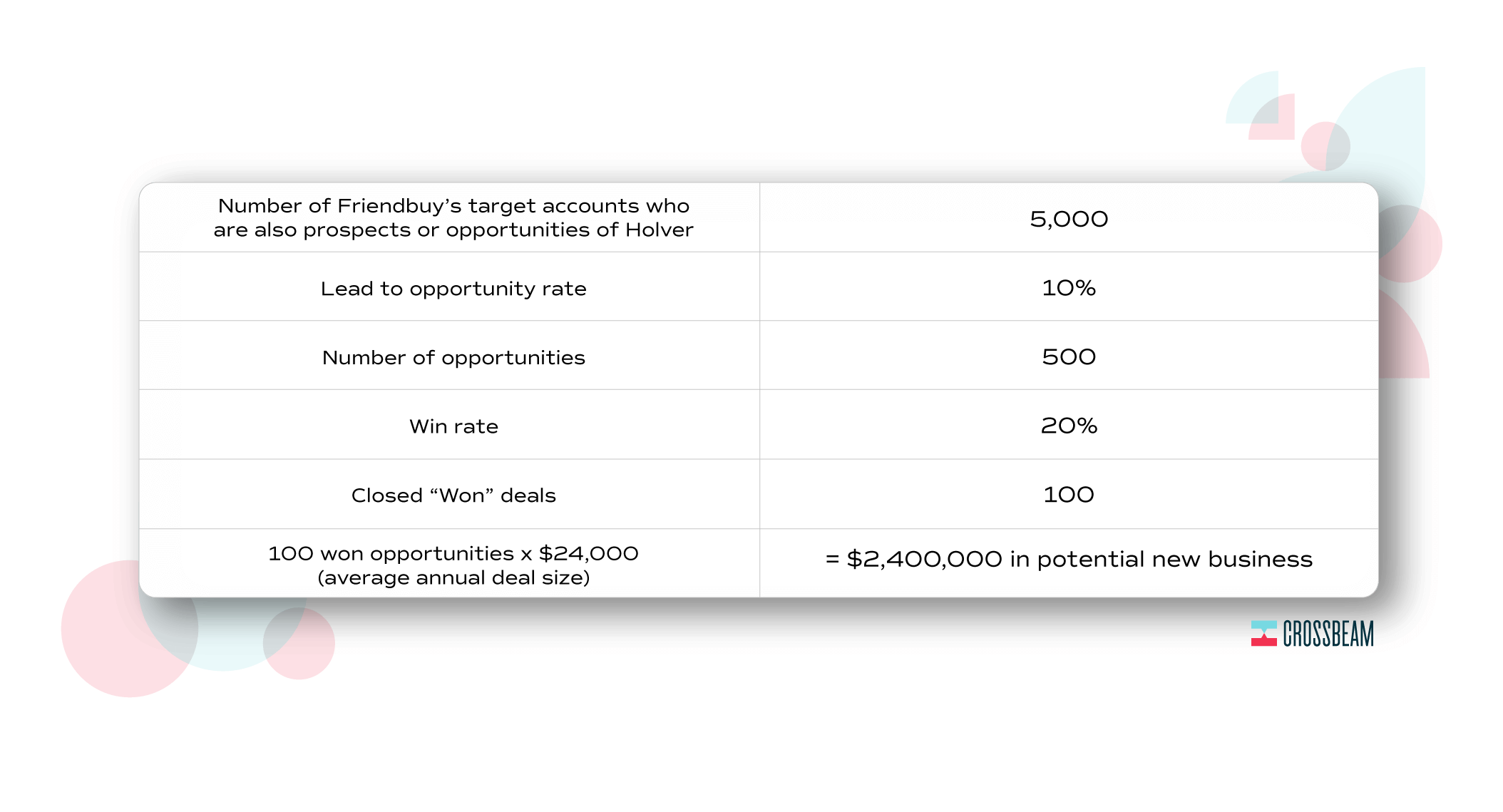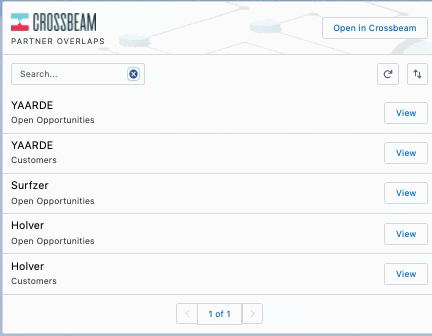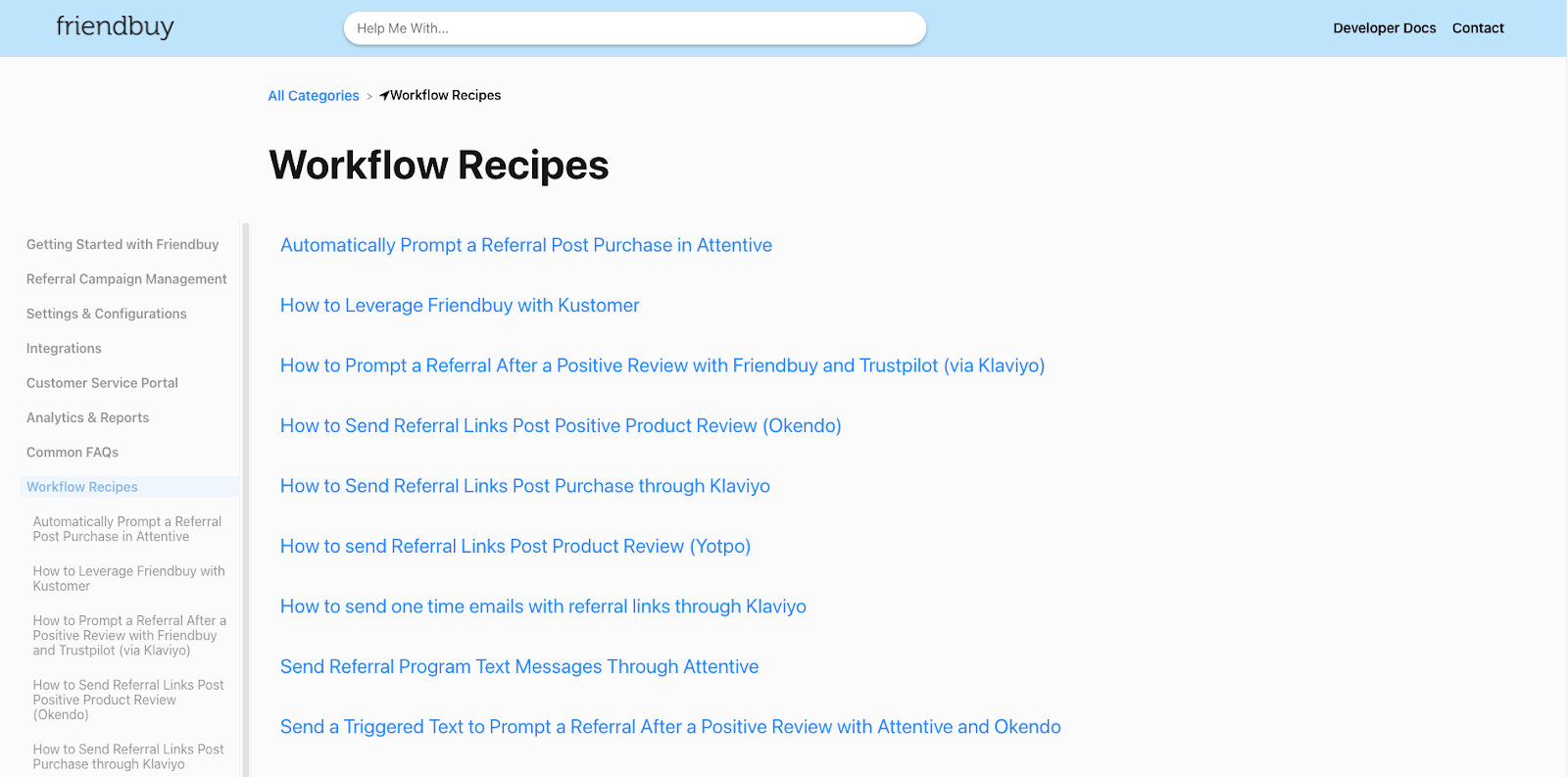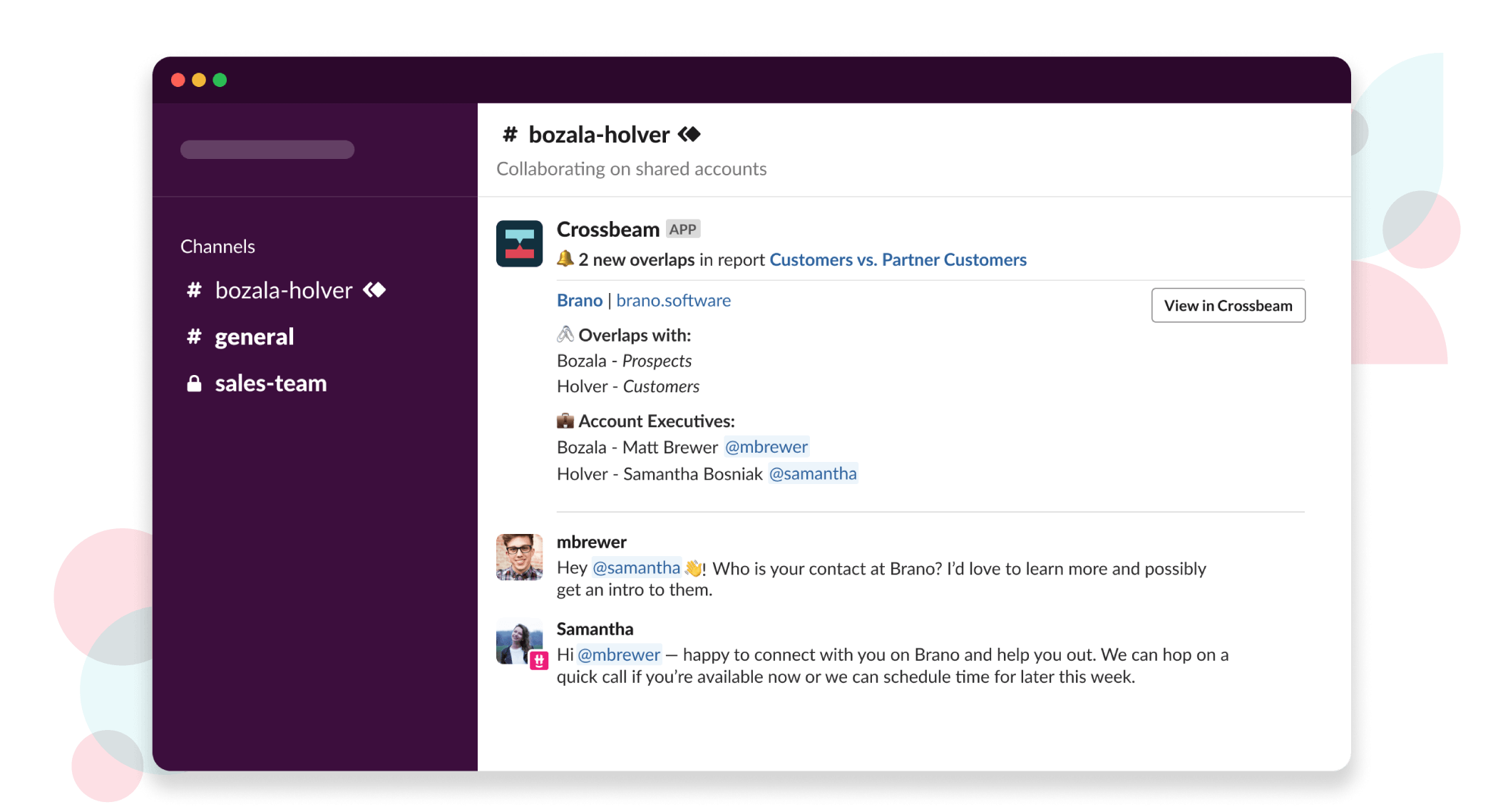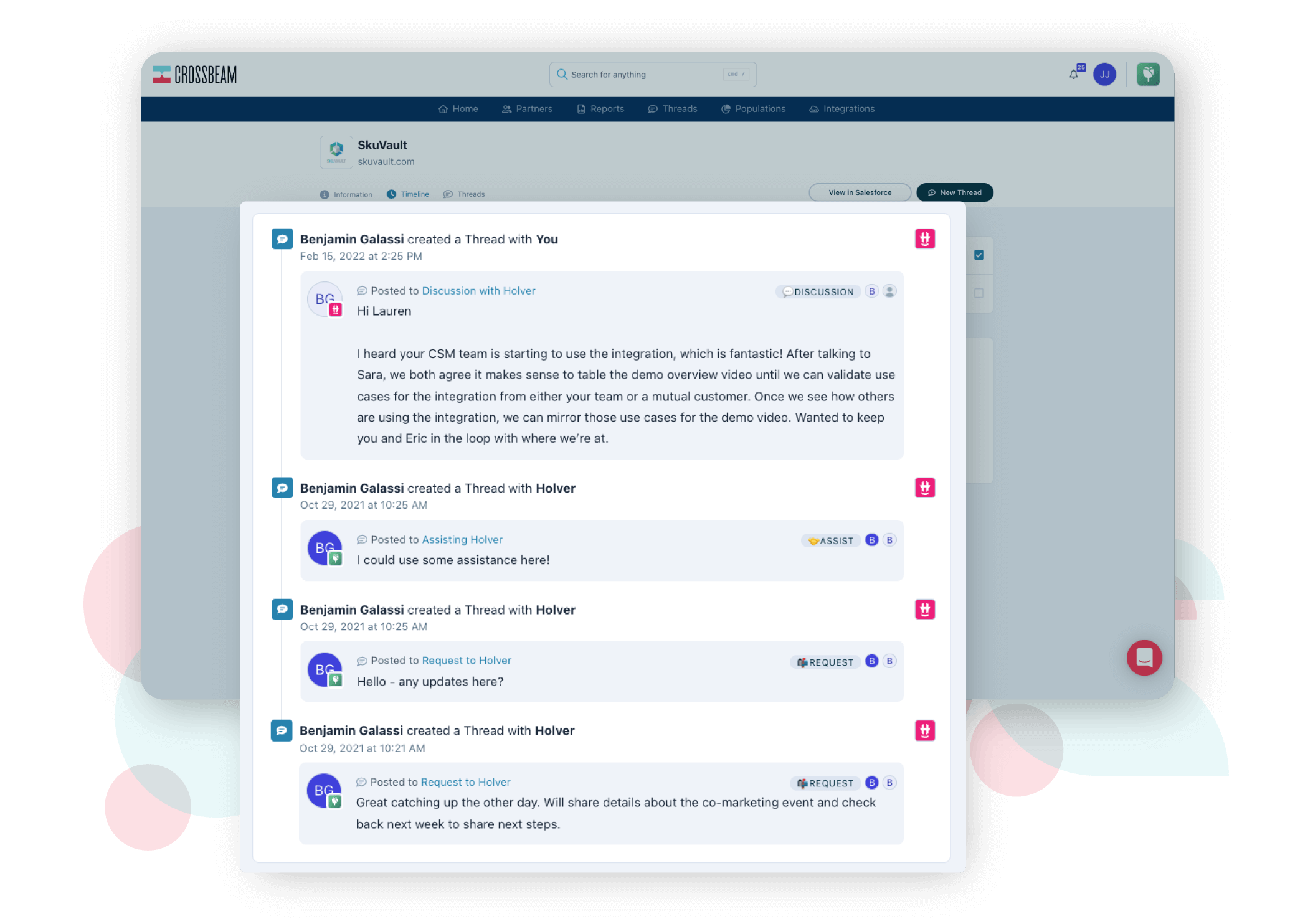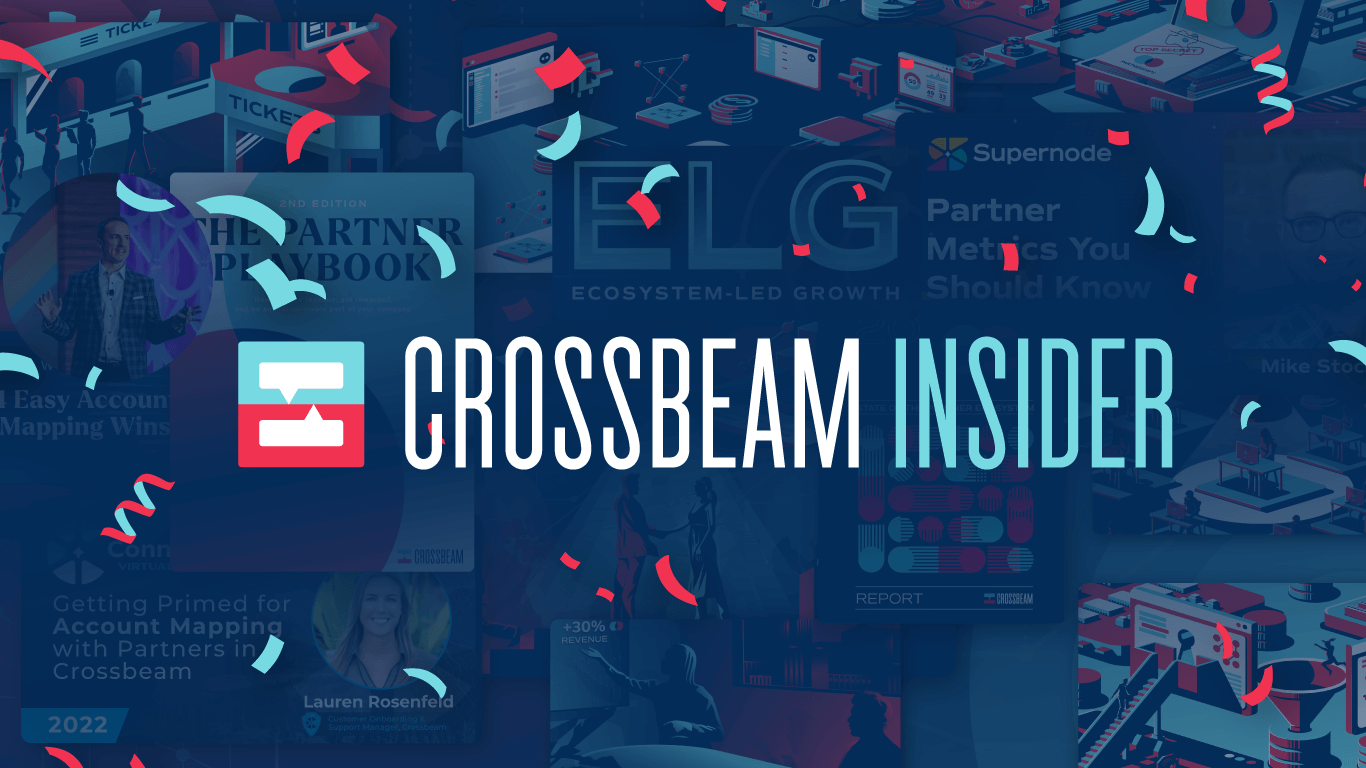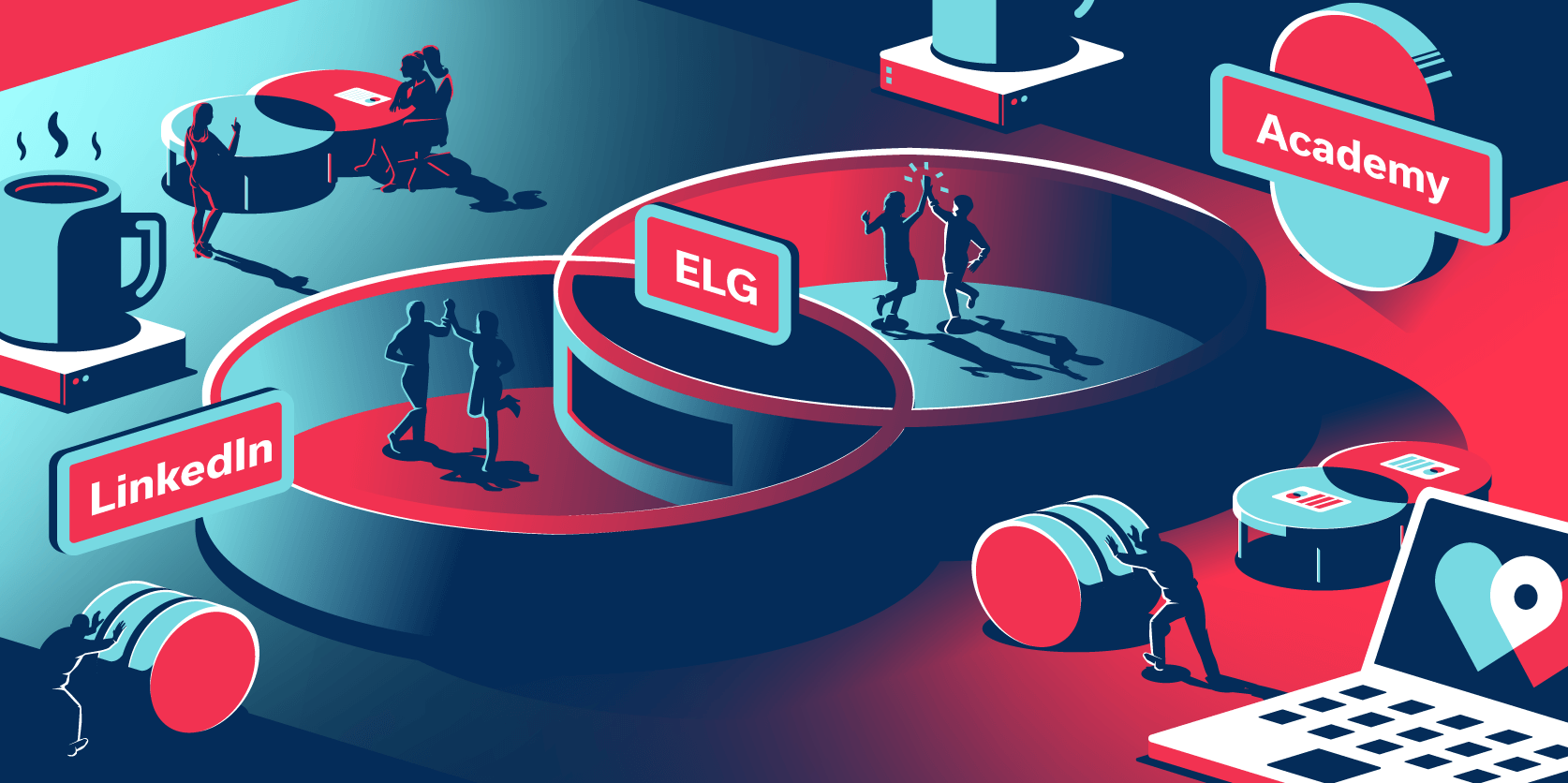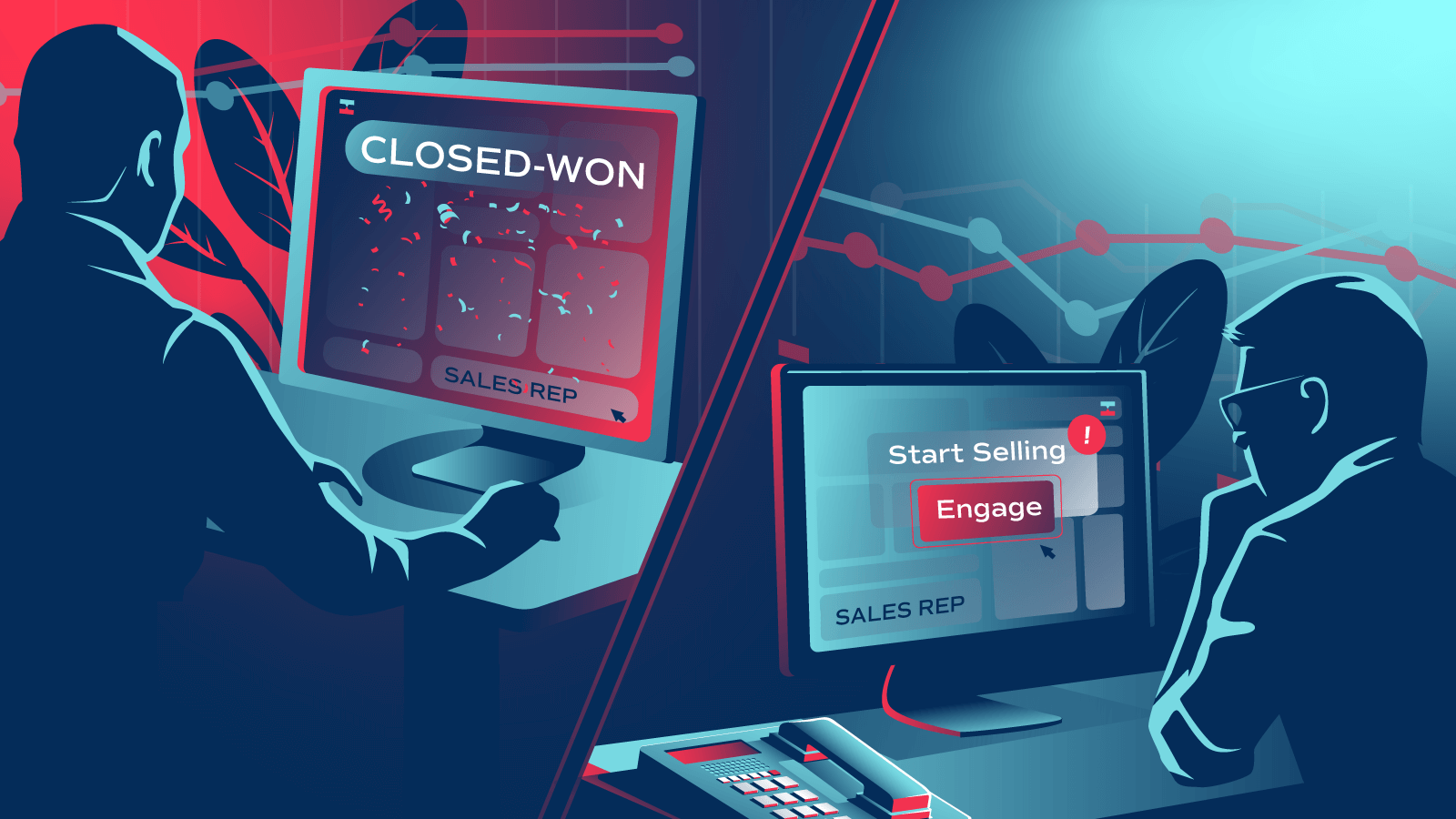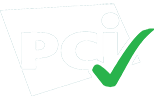Case Study
How Friendbuy Cultivated a Culture of Partnerships in 18 Months
Samantha Samuels, VP of Partnerships at Friendbuy, shares five plays for using Crossbeam data to surface 35% more partner-influenced and sourced opportunities.

2020
Agency and tech programs
40+
2-5 people
- Vetting integrations
- Accelerating co-selling motions
- Driving integration adoption
- Improving outbound outreach
In the Fall of 2020, Samantha Samuels, VP of Partnerships, told the Friendbuy leadership team, “I think Friendbuy is missing a Partnerships function, and that should be a strategic priority for us.”
Samuels rolled up her sleeves, and was determined to prove once and for all the value of a thriving tech partner program for the referral marketing platform company.
When Samuels started out, she was a team of one, relying on spreadsheets and emails to manage tech partners. “Life before Crossbeam was highly laborious,” says Samuels. “I would have to download our customer list from Salesforce, put the list in a Google Doc, share that list with partners after an NDA was in place, ask them to put their customer list in another tab, and we’d do a VLOOKUP to see where the overlap was,” says Samuels.
She couldn’t let manual processes bog her down any longer — so she invested in Crossbeam’s account mapping tools and integrations with Slack and Salesforce to help her drive ecosystem revenue.
“Since we adopted Crossbeam, 35% of our opportunities are partner-influenced or sourced,” says Samuels.
Today, the Friendbuy leadership team is asking themselves: “How else can we leverage our partners to get more business, get more customers, and make our product stickier?”
“Now we’re thinking about how we leverage partnerships in the most important decisions that we make as a company and Crossbeam has helped make that happen because of all the data we’re able to see at a glance. We’re also able to show the impact partnerships have on the company’s bottom line and retention,” says Samuels.
“Now we’re thinking about how we leverage partnerships in the most important decisions that we make as a company and Crossbeam has helped make that happen”
Samantha Samuels, VP of Partnerships at Friendbuy
Read on to learn Friendbuy’s top plays for using Crossbeam data to cultivate a partnerships-driven culture:
Play #1 – Build a numbers-backed business case for new integrations
When you can show an integration’s potential impact on revenue growth and retention, rallying your internal teams is a piece of cake.
For each new integration opportunity that presents itself, Samuels seeks to answer two questions:
- How much monthly recurring revenue (MRR) can we retain with this integration?
- How much do we think we can generate in new business with our open opportunities and/or mutual prospects?
“With the Account Mapping Matrix [in Crossbeam], I can see in an instant the number of mutual customers we have with a partner, the number of open opportunities, as well as mutual prospects,” says Samuels.
Once Samuels grabs the overlap counts (the number of mutual accounts with a partner) from Crossbeam, she checks Salesforce to get the MRR of those mutual customers and open opportunities. From there, she calculates the partnership’s total addressable market.
Here’s what some of those calculations might look like in a hypothetical scenario. Let’s pretend Friendbuy is evaluating a fictitious company called Holver as a potential partner.
First, we’ll look at how much MRR we can retain based on integration adoption:
Then, we’ll look at how much new business Friendbuy can generate by co-selling with Holver.
“It’s easy to say, ‘Here’s why we should prioritize this integration,’ and nobody can argue with the data,” says Samuels.
Play #2 – Get AEs hyped about working with partners
Partner data is top of mind for Friendbuy’s account executives (AEs) because it’s visible where they work most often: Salesforce.
The Crossbeam Widget displays on Friendbuy’s Accounts and Opportunity objects in Salesforce, allowing account executives to self-serve in identifying where they can include partners in the deal cycle.
“It’s been a big value add because they can see at a glance which of our open opportunities are customers of our partners,” says Samuels.
Samuels also attends sales pipeline meetings to hear how deals are going and pinpoint opportunities that could use some backup from tech partners. “The biggest benefit we’ve derived from upgrading to the paid version of Crossbeam is we can see in real time which open opportunities are customers of our partners during these meetings, and I can act more quickly to engage our partners to keep deals moving,” says Samuels.
During those meetings, she’ll recommend integrations or workflow recipes that account executives can share with prospects. Workflow recipes help customers use Friendbuy’s data in partner’s products to trigger workflows.
“I get the most excited when an AE says, “Hey, this workflow recipe that you created, I shared it with the prospect and that pushed them over the finish line.’ That gets me really excited because the work the partnerships team is doing is directly impacting a deal,” says Samuels.
Let’s say some of Friendbuy’s open opportunities are also customers of a fictitious tech partner called Bozala. Samuels will share integration help docs, one-pagers, and slides with the account executive to pass on to their contacts.
This helps the AE highlight the value of the Friendbuy and Bozala integration and it’s another selling point for the buyer to consider. “Enablement material for partners and internal customer success and sales teams is so important because everybody needs to be bought into the integration,” says Samuels.
For bigger deals, account executives will ping Samuels directly and say, “Hey, I see that this prospect is a customer of a partner. Can you ask the partner team to help out and see if they can put in a good word for us?”
From there, she’ll get to work bridging connections between her AE and her partner’s AE.
“I want the AEs to feel empowered to collaborate with the partnerships team to help them win deals,” says Samuels. “It’s rewarding to help them meet their goals and be a part of their success.”
Play #3 – Build trust and be a great partner
Like all great partnership leaders, Samuels knows partner reciprocity is key to a healthy relationship. “We leverage [Crossbeam’s] Slack integration to get notifications when any of our customers become open opportunities for our partners, so I can proactively reach out to our partners and say, ‘How can we help push this deal over the finish line?’”
Samuels and her partners will also chat about overlapping accounts using Threads, Crossbeam’s in-app messaging feature. For example, if a partner sees a target account is a Friendbuy customer in Crossbeam, they can quickly spin up a thread with Samuels to request a warm introduction into the account.
“Threads are a great way to keep track of conversations around specific accounts, as lots of these conversations can get lost in Slack. I also love that I can get email notifications when a new thread is opened or if one of our partners responds to the thread,” she says. All of the Threads related to that account are captured on a timeline in Crossbeam, making it easier to collaborate and track partners’ influence over time.
Samuels builds relationships with partners that go beyond just her partner manager counterpart: “Some of our partners will proactively introduce us to the CSMs who are managing the accounts we’re speaking with so we can gain insight into how we should be selling into these organizations,” says Samuels.
She’ll share relevant insights with her AEs to help them navigate complex deals.
Samuels also arms her partner’s CSMs with integration enablement materials, like presentation slides, visualizations highlighting integration benefits, and workflow recipes. “The biggest advantage of getting in front of a partner’s CSM is to say, ‘Hey, here are some recommendations for how you can communicate Friendbuy and the partner’s better together story to your customer.’” says Samuels.
“It’s one thing when the story is coming from an AE who’s trying to sell, but the CSM is a trusted advisor. So if this similar story is coming from the CSM and they’re able to frame it well, then that’s a huge value add for Friendbuy,” she adds.
Play #4 – Help the customer success team drive integration adoption
Friendbuy’s customer success team also uses the Crossbeam Widget in Salesforce to see which of their customers are also customers of tech partners.
“It’s a great strategy for our CSMs,” says Samuels. When she first rolled out the Crossbeam Widget, Samuels says her CSMs were thrilled. She says, “They said oh wow, I didn’t know this customer uses X, Y, and Z partners!”
Today, Friendbuy’s CSMs check the Crossbeam Widget on their accounts in Salesforce and pull relevant workflow recipes or help documentation to prepare for customer conversations.
“Then, that’s another talking point for our CSM to say [to a customer], ‘Oh, Hey, I saw your team just adopted this new tool in your tech stack. Guess what? We have an integration with this tool. We have a ton of materials to help you get the most out of this integration, including help docs and workflow recipes,’” says Samuels.
Play #5 – Increase outbound opportunities by 45% with partner-led messaging
Samuels had a hunch that highlighting partner relationships and “better together” messaging in outbound sequences would resonate more with prospects. So, she tested her theory by sending outbound emails to customers of her partners.
“We had our generic outbound sales messaging, but once we switched to partner-led outbound sales efforts, we increased our outbound opportunities by 45%,” says Samuels. “Any leads that we get from that outbound outreach, we are tagging as partner sourced [in Salesforce],” she says.
These partner-led outbound emails include:
- An acknowledgement that Friendbuy’s platform integrates with a tech partner’s product
- The value proposition(s) of the integration with some social proof to establish credibility (i.e. customer testimonials, blog posts, case study)
- A call to action prompting the prospect to book a meeting with Friendbuy’s team.
It’s like when the cool kid invites the new kid to sit at the popular lunch table, and boom — the new kid gets instant credibility. You’re the new kid, your partner is the cool kid, and at the lunch table are the prospects you’re trying to win over.
Now, Friendbuy opts for partner-led outbound messaging over generic cold outreach — and they just hired their first SDR to continue executing a partner-led outbound strategy.
“Focusing our efforts on partner-led messaging really helps other parts of the business too,” says Samuels.
–
By piping partner data into Crossbeam’s Salesforce Custom Enrichment Object, Samuels builds partnership reports in Salesforce. She measures and tracks how many open opportunities are sourced or influenced by partners, and then shares that information directly with her leadership team. This way, they can see the direct impact tech partners are driving for the business.
“Crossbeam has allowed us to make partnerships such an integral part of our operating procedures,” says Samuels. “It’s our MO.”
Turn your ecosystem into your #1 revenue source
Get started in under a minute. Instantly capture insights from your partners. Identify more opportunities. Did we mention it’s free?


